INTRODUCTION:
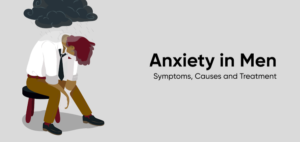
Anxiety is one of the psychological conditions that develops in response to stress or past trauma. It may be due to any fear and the outcomes it can produce which are accompanied by some physical symptoms. Alot of people around the world don’t even know that they are suffering from anxiety and alot feel ashamed in talking about it due to fear of judgement and misunderstanding as it is considered a social stigma in the society in which we are living. The racing of the heart, the tightening of the chest and the churning sensations in stomach are all red lights indicating the signs of anxiety.
UNDERSTANDING ANXIETY:
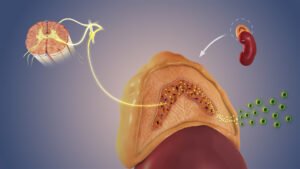
Anxiety symptoms are basically body’s response to potential threats or conditions. These are ‘fight or flight’ responses due to the action of Sympathetic Nervous System which are normal coping mechanisms of body. This system releases stress hormones like adrenaline and cortisol which prepares the body for action. Long term release of these hormones due to anxiety can alter the normal functions of an individual and when anxiety becomes chronic it can convert into an anxiety disorder which are of different types. Some are mentioned below.
TYPES OF ANXIETY:
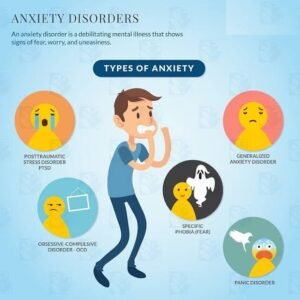
1.GENERALIZED ANXIETY DISORDER:
Continuous and excessive worry about a number if things.
2.SOCIAL ANXIETYDISORDER:
Fear of social gatherings and meetings.
3.PANIC DISORDER:
Involves episodes of sudden fear and physical symptons like palpitation, sweating and shortness of breath.
4.SPECIFIC PHOBIAS:
Fear of things or situations like fear of height, water or spiders etc
5.OBSESSIVE COMPULSIVE DISORDER (OCD):
In this disorder person repeatedly do things that he don’t wanted to eg washing hands alot, fear of germs, repeatedly checking locks etc.
6.POST TRAUMATIC STRESS DISORDER:
Anxiety which arises after a sudden traumatic event which the individual has not expected to occur. For eg survivors of war or road traffic accident.
7.SEPARATIONANXIETYDISORDER: It arises due to separation from a loved one. It is more common in children and pet animals.
8.AGAROPHOBIA: (Fear of situation and places) from where it is difficult to escape in case of sudden anxiety attack.
SIGNS AND SYMPTOMS:
To know whether you are suffering from anxiety or not it is important to know about the sign and symptoms it can produce so that you can keep a check on yourself. Let’s delve and take look on it.
PHYSICAL SYMPTOMS:
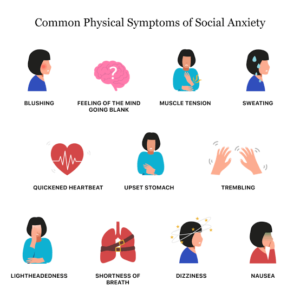
- RAPID HEARTBEAT:
A person suffering from anxiety will feel like his heart is pounding and it will into his mouth or out of his chest.
- MUSCLE STIFFNESS:
A victim of anxiety will feel like as jaws, chest and shoulder muslces are tightening.
- SHORTNESS OF BREATH:
Shortness of breath is also a sign of anxiety, as the patient enters the state of hyperventilation.
- GI DISTURBANCES:
Gastrointestinal issue also make their way in the manifestation of anxiety in the form of stomach ache, diarrhea, nausea.
PSYCHOLOGICAL SYMPTOMS:
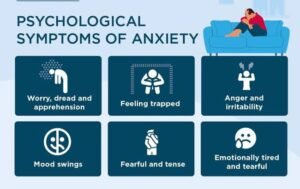
- EXCESSIVE WORRY:
Anxiety can produce a state of worriness in an individual. He is always worried about the events that will happen or happened.
- IRRITABILITY:
Anxiety patients can become irritable even on slightest issues. As they can not withstand the slightest disturbances.
- DIFFICULTY CONCENTRATING:
They can’t even concentrate on work as they have a lot of things going on their mind which makes them less productive.
- FEAR OF LOSING CONTROL:
They have a fear of panic going on their mind that something will happen to them or their surrounding.
BEHAVIOURAL SIGNS:
- AVOIDANCE:
People with anxiety tend to avoid public gatherings and socializing as these activities can trigger their symptoms and put them in unease.
- RESTLESSNESS:
Anxiety patients remain restless and often indulge themselves in a lot of work and try to keep them busy.
- INSOMNIA:
They also suffer from insomnia which is a condition characterized by trouble sleeping. This maybe due to overthinking or a load of thoughts going through their minds which makes it difficult for them to sleep.
SOCIAL AND INTERPERSONAL SYMPTOMS:
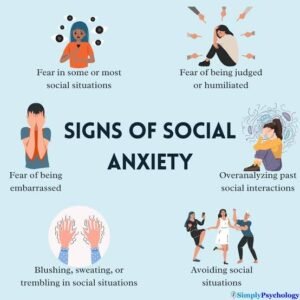
- ISOLATION:
People with anxiety isolate themselves as they find it comforting to be alone rather than around people.
- CONSTANTLY SEEKING REASSURANCE: Constantly seeking reassurance about one’s fears and worries is also a sign of anxiety.
- RELATIONSHIP ISSUES:
key factors in a relationship like communication, trust and intimacy is altered in such individuals which make it difficult for them to maintain relationships.
COGNITIVE SIGNS
- CATASTROPHIC THINKING:
They make up the worst-case scenarios in their mind which can occur in any given situation.
- OBSESSIVE THINKING:
Anxiety can make them to think obsessively about past events and future possibilities.
- HYPERVIGILENCE:
Anxiety patients become hyper aware of the potential threats and dangers that can occur.
CAUSES OF ANXIETY:
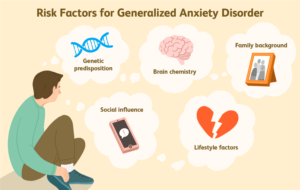
To treat something it is very important to know it’s root cause so that we can eliminate it completely. Here are some causes mentioned below that can trigger anxiety in an individual.
- GENETICS:
Genetics play a very crucial role in development of anxiety as it is most likely to have anxiety if it runs in your family.
- TRAUMA AND STRESS:
Past trauma and stress in life contribute a lot in developing anxiety as they can erode a person’s mental health completely.
- PERSONALITY FACTORS:
Perfectionist and people with pessimist thoughts are more likely to develop anxiety as they thought alot about doing the things with utmost perfection or the negative thoughts clutter them completely.
- ENVIRONMENTAL FACTORS:
The surrounding of a person affect a lot on his mental well being and it can be in the form of cultural norms, socioeconomic condition, crime rate in an area or academic or job stress.
- LIFE TRANSITION AND MAJOR EVENTS:
The change in normal pattern of life can exacerbrate the feelings of anxiety for e.g moving to a new state, changing a job, death of a loved one, breakups, or may be birth of a child which can put some responsibilities on you.
- SUBSTANCE ABUSE:
Some people start using alcohol or other drugs to alleviate the symptoms of anxiety or to get some relief but they make themselves to drop in this dependency cycle and experience more anxiety symptoms if they don’t take drugs.
TREATMENT:
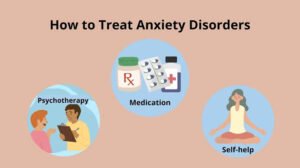
THERAPIES:
- COGNITIVE BEHAVIOURAL THERAPY:
This type of therapy focuses on correcting negative thought processes and patterns and replace them with better and positive coping mechanisms.
- EXPOSURE THERAPY:
By exposing the individual to his respective phobias repetitively it is possible to desensitize him to his anxiety triggers.
- MINDULLNESS BASED THERAPY:
Therapies like meditation influence the patient to develop acceptance of the problems and he is less triggered by them.
- MEDICATIONS:
Medications like Antidepressants and Benzodiazpenes are prescribed to alleviate the symptoms of anxiety but some are addictive so it is important to take extra care and only consume by prescription of a health-care professional.
2. REGULAR EXERCISE:
Exercise is very important for physical as well as mental health and it causes the body to release endorphin which enhances mood relieves stress.
3. SLEEP HABITS:
Healthy sleeping pattern is very important in managing stress and anxiety. An adult should take approximately 7-8 hours of sleep to maintain a healthy body and mind.
4.BALANCED DIET:
Nutritions also play a very important role in our life, a perfect blend of protein, carbs, fats, fruits and vegetables regulate healthy brain functions.
5.SELF CARE PRACTICES:
Self care practices which you can do for yourself easily at home can also leave a major impact in treating anxiety. Some of them includes:
- JOURNALING:
It is a good habit to indulge in your daily life routine as it allows you to empty your heart out on a paper and gives a lot of relief.
- AROMATHERAPY:
Using scented candles while un bath or reading can also improve your mood and makes you fresh.
- HERBAL REMEDIES:
Making yourself a blend of different herbal teas like chamomile, lavender and valerian root also helps a lot but use it cautiously and seek professional help before incorporating it in diet.
- REDUCE ALCOHOL AND CAFFEINE:
Both triggers anxiety and should be avoided.
- BE CLOSE TO NATURE:
Spending time in nature also enhances your mood and thoughts and flushes away negativity.
- SPEND TIME WITH LOVED ONES:
Communicating with friends and family help a lot in managing anxiety. Try to be around them and seek their help.
- SETTING BOUNDARIES:
Start saying ‘NO’ to things you are not comfortable around or which triggers you, your self-esteem and certainly your anxiety.
CONCLUSION:
Anxiety is becoming a common problem which is rapidly prevailing in our society due to different factors. Many are victims of this condition but only a few admit it and seek professional. So, it is our responsibility to create awareness break the social stigma so that we can be free from this destructive illness.


Nice